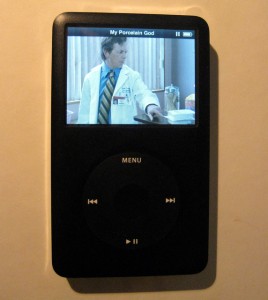Naked Bike Ride (St. Louis) 2009: to protest dependency on oil and to celebrate our bodies
Last year, I reported on the 2008 Naked Bike Ride in St. Louis, the first ever in my home town. The official purposes are twofold: to protest dependency on oil and to celebrate our bodies. It's also a blast riding through town without having to worry about motor vehicles and without having to wonder what one's fellow travelers look like naked (or almost naked).  This year's St. Louis Naked Bike Ride occurred tonight, with perfect temperatures for not wearing much of anything or not wearing anything at all. I'd make a wild guess and say that there were about 1,000 bike riders tonight, 70% of them male. I'd also guess that about 20 of them were riding completely naked. I saw people from 16 to 70 years of age. Lots of camaraderie--the riders were warning each other of potholes and other road hazards. I only saw a few spills--luckily, those falls involved people with some clothing to protect them.
This year's St. Louis Naked Bike Ride occurred tonight, with perfect temperatures for not wearing much of anything or not wearing anything at all. I'd make a wild guess and say that there were about 1,000 bike riders tonight, 70% of them male. I'd also guess that about 20 of them were riding completely naked. I saw people from 16 to 70 years of age. Lots of camaraderie--the riders were warning each other of potholes and other road hazards. I only saw a few spills--luckily, those falls involved people with some clothing to protect them.  The genius of this event's marketing is that every local media outlet was out there reporting on the event. Imagine having a clothed bike ride to protest oil dependency. You would probably only have the attention of a few eccentric bloggers like me.
Speaking of which, I was there tonight (wearing boxers), riding a course that was modified (shortened to about 7 miles) at the last minute, apparently to avoid the outflow of a huge crowd from a Cardinal Baseball game downtown. We wouldn't want those people to be embarrassed were we to ride by and see them dropping exorbitant amounts to amuse themselves--$50 for tickets and $7 for hot dogs. Not while we--the naked and almost naked riders--were out there protesting oil and admiring and celebrating each others' nakedness, all for free.
I would like to point out that the aim of this bicycle ride to celebrate our bodies is not a trivial issue. Refusing to celebrate the human body is closely related to our refusal to consider that humans are animals. These two dyfunctions are the cause of constant needless and useless human suffering. See this earlier post on terror management theory and this post on the dysfunction that stems from our failure to accept that humans are animals.
The genius of this event's marketing is that every local media outlet was out there reporting on the event. Imagine having a clothed bike ride to protest oil dependency. You would probably only have the attention of a few eccentric bloggers like me.
Speaking of which, I was there tonight (wearing boxers), riding a course that was modified (shortened to about 7 miles) at the last minute, apparently to avoid the outflow of a huge crowd from a Cardinal Baseball game downtown. We wouldn't want those people to be embarrassed were we to ride by and see them dropping exorbitant amounts to amuse themselves--$50 for tickets and $7 for hot dogs. Not while we--the naked and almost naked riders--were out there protesting oil and admiring and celebrating each others' nakedness, all for free.
I would like to point out that the aim of this bicycle ride to celebrate our bodies is not a trivial issue. Refusing to celebrate the human body is closely related to our refusal to consider that humans are animals. These two dyfunctions are the cause of constant needless and useless human suffering. See this earlier post on terror management theory and this post on the dysfunction that stems from our failure to accept that humans are animals.

